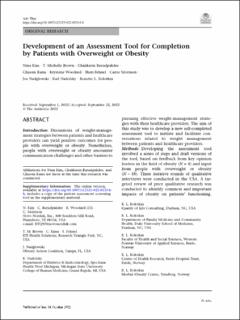| dc.description.abstract | Introduction
Discussions of weight-management strategies between patients and healthcare providers can yield positive outcomes for people with overweight or obesity. Nonetheless, people with overweight or obesity encounter communication challenges and other barriers to pursuing effective weight-management strategies with their healthcare providers. The aim of this study was to develop a new self-completed assessment tool to initiate and facilitate conversations related to weight management between patients and healthcare providers.
Methods
Developing the assessment tool involved a series of steps and draft versions of the tool, based on feedback from key opinion leaders in the field of obesity (N = 4) and input from people with overweight or obesity (N = 18). Three iterative rounds of qualitative interviews were conducted in the USA. A targeted review of prior qualitative research was conducted to identify common and important impacts of obesity on patients’ functioning. Standard qualitative analytical methods were used to identify concepts of importance in a concept elicitation exercise during the interviews and were evaluated for potential inclusion in the tool. Potential problems with the tool were flagged during cognitive debriefing of the draft tool.
Results
During 18 individual interviews, participants referenced the impact of their weight on their lives, including health and comorbidities, physical function, emotional/mental functioning, social life, and physical appearance. Over the course of the tool’s development, 24 common and important impacts of obesity on patients’ functioning were reduced to a final set of eight concepts in the final tool that were deemed important and relevant to both patients and key opinion leaders.
Conclusions
The assessment tool is a five-item, self-completed measure expected to foster patient self-advocacy for individuals with overweight or obesity by giving them an opportunity to define their weight-management goals and discuss these, along with various medical interventions, with a healthcare provider. | en_US |

